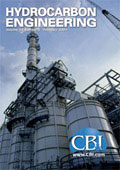Editorial comment
Global leaders have declared the recession official and recent oil and gas industry announcements and reports are pushing any vaguely good news to the wayside. A recent article in the Financial Times provided a glimmer of economic optimism as it discussed the benefits of falling materials costs in the oil and gas industry.
Register for free »
Get started now for absolutely FREE, no credit card required.
Global leaders have declared the recession official and recent oil and gas industry announcements and reports are pushing any vaguely good news to the wayside. A recent article in the Financial Times provided a glimmer of economic optimism as it discussed the benefits of falling materials costs in the oil and gas industry. However, despite the first cut in 10 years being described as a force that is helping bolster the profits of companies, analysts argue that the news is bittersweet, with a potential decrease in costs only forcing the price of a barrel of crude even lower, as industry costs put a floor under the price. The article suggests that this could ultimately lead to the price of a barrel falling below costs, causing supply to drop and yet more projects to be cancelled.
A 2008 end of year trading update from global consulting engineering firm, Amec stirred some enthusiasm. Despite the rapid slump at the end of last year, the company improved its order numbers from the oil and gas industry and predict its end of year pretax profits to exceed £ 200 million. Amec’s chief executive, Samir Brikho, said in the report, ‘we continue to see a strong and diverse range of attractive prospective contracts across the business and have seen only minor delays and cancellations of prospective projects compared with those we would expect to see normally;’ however, one company’s optimism is not enough. At the time of writing, Corus, Europe’s second largest steel producer, announced 3500 global job cuts as steel prices have halved since September and demand has fallen by 40% since last year’s peak. Also, Schlumberger, an oil and gas industry giant, announced 5000 global job cuts, partly due to a 17% drop in fourth quarter profits. Whilst both companies will be losing a large proportion of their workforce, these drastic actions are possibly the right ones to take as companies in all industries begin to implement cost management measures.
ConocoPhillips announced its US$ 12.5 billion capital programme on 16th January. The plan, around US$ 2 billion less than last year, projects a 4% cut in the overall work force and a continued delay in the Yanbu, Saudi Arabia refinery project but the positive actions are outlined with confidence. Jim Mulva, chairman and chief executive officer for ConocoPhillips said that the ‘2009 capital programme is structured to continue funding significant projects that will grow and develop the company, while deferring or slowing some projects and other programmes’ and the overall figures appear to do just that. 82% of the budget will be allocated to E&P, US$ 5.2 billion is being invested in North American projects and US$ 5.1 billion is being spent in Europe, Asia, Africa and the Middle East. 16% of the budget will be put into refining and marketing, US$ 1.4 billion for US businesses and US$ 0.6 billion for international developments. Compared to last year’s capital programme, there is no change in the planned spending in refining and marketing and only a small dip in the allotted portion for E&P. However, the company’s earnings report, still to be announced at the time of writing, could yet dampen the statements.
ExxonMobil is reported to be joining ConocoPhillips by keeping spending on a relative par with 2008 and will officially publish its report on Friday 30th January. Plans announced at the end of last year to invest US$ 1 billion to increase cleaner diesel supply at three of its refineries will be a highlight of Exxon’s 2009 activities. Also, the surprising call for a carbon tax from ExxonMobil is, for some, welcome news. However, in the current climate, as Rex W. Tillerson, chairman and CEO of ExxonMobil said, ‘it is hard to speak favourably about any new tax.’
It appears that at the moment, and for some time to come, bad news will inevitably accompany the good and on occasions over shadow it. In this issue of Hydrocarbon Engineering, Gordon Cope’s article ‘The Good, The Bad and The Ugly’ (p. 12), further confirms that the rough is continuously following the smooth as he discusses the North American natural gas sector.

